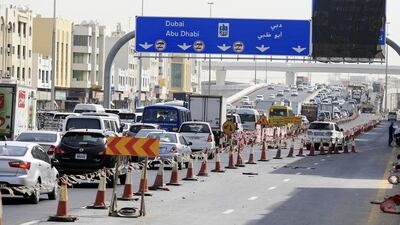I agree that an extension of the Dubai Metro into Sharjah would ease the emirate's traffic problems (Sharjah's slow lane, February 16). It should be extended all the way to the Quran roundabout so as to cover several areas of Sharjah. Once that's done, you will instantly see a drop in traffic. If people in New Jersey can take the subway to Manhattan every day and people in Sweden can take the train to Denmark to work, then why not Sharjah-Dubai? Currently, the Metro stops in Al Nahda, right before the border. Dubai needs to start talking with Shrjah.
Mike Bruski, Sharjah
Sharjah road conditions are different from Dubai and Abu Dhabi.
The main road in Sharjah has only three lanes, while others have only two lanes. Furthermore, there are plenty of roundabouts in the emirate in close quarters, many of which have no signals. All this causes traffic chaos. The bus service is also not adequate in some areas.
Danu Broto Satriyo, Dubai
Is the tram making any difference?
I read with interest the story about the Dubai Tram (Trams are the glue of cities, February 15).
My family has been living in the Marina for eight years. We were planning to move out last year when the construction did not seem to end and I’m happy we waited.
My children now use the tram around the Marina and Jumeirah Lakes Towers to meet their friends or for activities so my husband and I no longer have to drop them. We do wait longer at the traffic signals than before, but everything is much better organised now. There is certainly traffic in the evening for two hours, but you will find that in any area in the evening with people trying to get home. I’m tired of people moaning about the tram and blaming it for everything.
Sizette Karl, Dubai
The editorial has missed the mark. Firstly, it draws a false comparison in praising the benefits of traditional tram systems and equating them to the Dubai Tram. Trams are great and serve city transport systems well when they serve more immobile (usually poorer) parts of the population and moves people to and from the city centre for work. The Dubai Tram serves some of the very richest and most mobile sections of society and move people slowly from one limited residential area to one limited commercial area. It would have made much greater sense to build a tram in the Bur Dubai or Deira area of the city.
Secondly, it claims that while some drivers in the Marina are inconvenienced, “ ... these are minor and overall the entire city will benefit”. From various comments, the disruption caused by the tram and, in particular, the RTA’s decision to ban many left turns and vital U-turns have increased journey times of local residents by an average of 15 minutes. Over the course of a week, this is over an hour of extra time spent in the car. This equates to tens of millions of dirhams in time lost for the residents of the Marina and the local economy.
Peter Ganney, Dubai
Don’t be lenient on ISIL fighters
With reference to the article Former fighters should be offered a way back home (February 16), I think those who chose to join ISIL should be stripped of their citizenship so they cannot return. If you don't block their return to their country, they will inflict more harm on the country that raised and fed them.
Hans Borst, Dubai
Rehabilitating returnees should never be an option for any country. In this regard, Jordan has done well by deciding to arrest people for just expressing support for ISIL via Facebook, Twitter and WhatsApp. ISIL sympathisers should know the consequences of their action. You cannot deter them by adopting soft policies on them.
Rashid Yahya, Sharjah
Lebanon can regain its beauty
I am delighted to learn about the Lebanese government's campaign to remove political flags, banners and posters from the streets of Beirut and other cities (Lebanon's banners of discontent, February 16). I think it should extend the campaign further by bringing down posters of all kinds, including religious ones, and replacing them with art. That will help the country to regain its beauty.
Rania Abdin, Dubai

